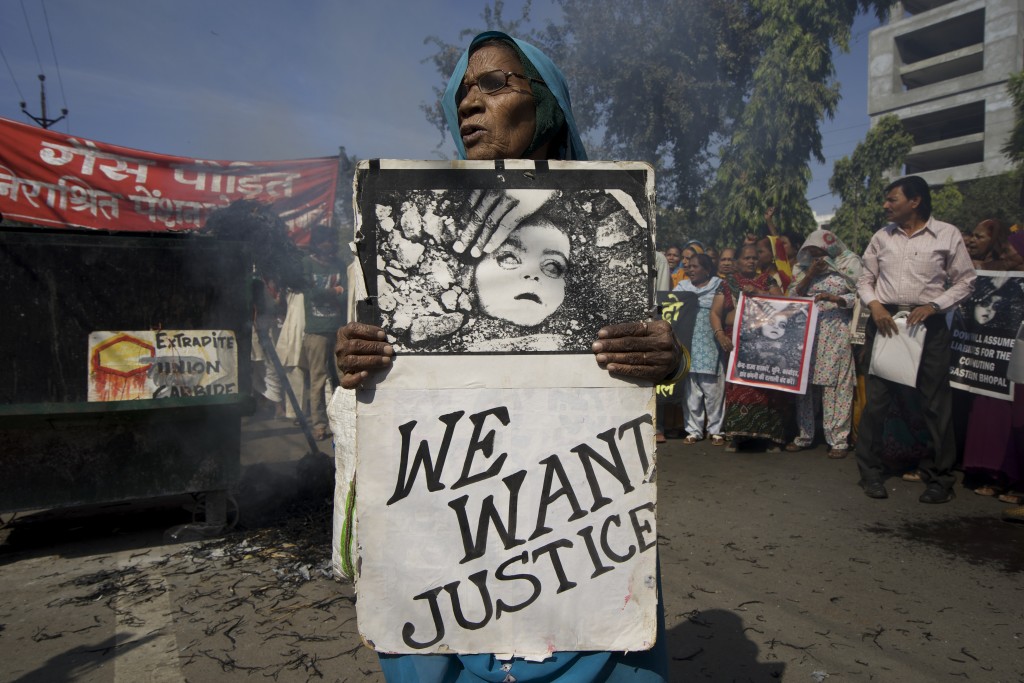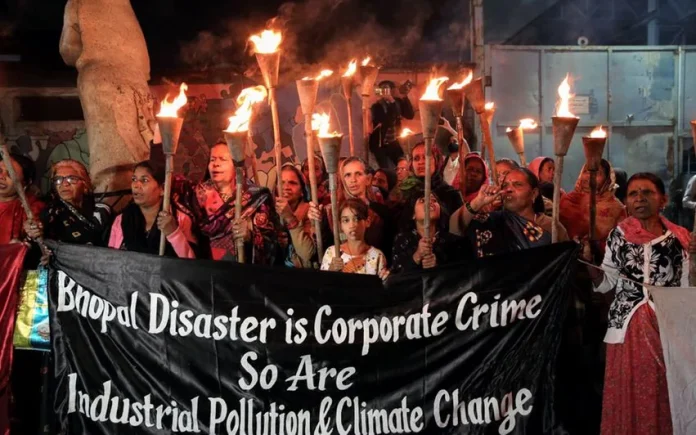– Pervez Bari
Bhopal: Forty years after the devastating Bhopal gas tragedy of December 1984, the survivors continue to endure immense suffering with little attention to their plight.
Marking the 40th anniversary, four NGOs advocating for the survivors organised a rally at the abandoned Union Carbide factory site. Protesters carried an effigy symbolising “corporate crime” and raised slogans condemning regional, national, and international leaders as well as global relief organisations for failing to provide justice and dignity to the victims. Survivors continue to rely on groundwater contaminated by hazardous waste from Union Carbide, a reminder of the ongoing crisis.
On Monday, survivor organisations commemorated the tragedy with a torch rally. Rashida Bee, President of Bhopal Gas Peedit Mahila Stationery Karmachari Sangh, accused successive U.S. presidents, from Ronald Reagan to Barack Obama, of shielding Union Carbide and Dow Chemical from legal accountability in India.

“We urge President-elect Donald Trump to end the legacy of injustice in Bhopal as part of his pledge to make America great again. We hope he will act against Union Carbide and Dow Chemical, in the spirit of Republican President Theodore Roosevelt’s Square Deal, which regulated oppressive corporations,” said Bee.
Balkrishna Namdeo, leader of Bhopal Gas Peedit Nirashrit Pensionbhogee Sangharsh Morcha, criticised past Indian governments for failing to establish a Medical Commission in 2008 for survivors’ long-term rehabilitation. “The lack of a commission has exacerbated illnesses and deaths among survivors. Will Shivraj Singh Chouhan, now a minister in the Central cabinet, take responsibility for this prolonged suffering?” he asked.
Rachna Dhingra from the Bhopal Group for Information and Action highlighted the environmental impact: “During the Modi regime, Dow Chemical’s business in India has grown tenfold, yet the company has not cleaned the contaminated groundwater, which has spread 3 kilometres into the city. Instead, Dow continues to evade accountability while selling Union Carbide’s assets to Indian PSUs.”
Nawab Khan of Bhopal Gas Peedit Mahila Purush Sangharsh Morcha criticised international organisations for their apathy: “Had the Bhopal disaster been caused by a natural calamity, international agencies like WHO would have intervened with long-term relief and research. The neglect of corporate crime victims reflects a global indifference.”
Survivors and their advocates have outlined a five-point charter of demands:
– Prosecute Dow Chemical in the criminal case related to the disaster.
– Expedite proceedings against Union Carbide’s Indian subsidiary and its executives.
– Enforce bans on Indian PSUs selling Union Carbide products.
– Dow Chemical must compensate for health damages, including congenital disorders and immune system damage in children.
– Provide restitution for groundwater contamination around the Union Carbide site.
– The government must fulfil the Supreme Court’s 1991 settlement order by paying ₹5 lakh to each victim.
– Establish the Empowered Commission on Bhopal, approved in 2008, with a ₹1,000 crore fund.
– Scrap the merger of AIIMS Bhopal with BMHRC to preserve specialised healthcare for survivors.
– Ensure free medical care for residents affected by contaminated groundwater.
– Resume research on long-term health effects through NIREH.
– Utilise the ₹129 crore earmarked for job creation and pensions for survivors.
– Provide housing to displaced residents affected by groundwater contamination.
– Increase the monthly pension for widows of disaster victims from ₹1,000 to ₹3,000.
– Dow Chemical must clean up the soil and groundwater contamination caused by Union Carbide.
– The government should seek UN assistance for a comprehensive environmental assessment.
– Provide clean drinking water to all communities within a 4.5 km radius of the factory.
On the night of December 2-3, 1984, nearly 40 tons of toxic methyl isocyanate gas leaked from Union Carbide’s pesticide plant, affecting over 500,000 people. Approximately 3,000 died instantly, and more than 25,000 have succumbed to gas-related illnesses over the years. Even now, hundreds of thousands suffer lingering effects, and thousands remain permanently disabled.
Survivors continue to demand justice, accountability, and relief as they struggle against a legacy of corporate neglect and governmental failure.




